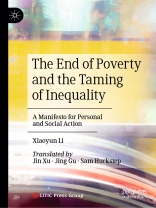In this book, Li Xiaoyun tries to address these questions that attract public attention in today’s China. Drawing on classic and cutting-edge poverty research from political economy, economics and social psychology, Li elaborates on the political and social meanings of China’s recent war on extreme poverty and the institutional set-ups that helped the country successfully escape the poverty trap. Adopting a quasi auto-ethnography of his poverty experiment in a poor ethnic village in China, Li presents an excruciating adventure of how the country and its people fought against poverty from a bottom-up perspective which brings this book alive. A collection of essays and opinion pieces, this book is an “espresso” of Li’s insights and inquiries on China’s chronical and transitional poverty which may interest not only a small circle of poverty researchers, policy-makers, practitioners, but also a wider spectrum of readers who want to understand a real China in development.
表中的内容
Chapter 1: Origins of Poverty.- Chapter 2: The Need to Help the Poor.- Chapter 3: What Needs to Be Done.- Chapter 4: Why Is It so Difficult to Eradicate Poverty?.- Chapter 5: Why a War on Poverty?.- Chapter 6: How Did a Village Escape Poverty?.
关于作者
Li Xiaoyun is currently Lead Chair Professor of Development Studies at China Agricultural University (CAU) and served as Honorary Dean of College of International Development and Global Agriculture (CIDGA) at the University. He is most well known for his research and practice in poverty reduction and international development which has won him the reputation of “the Chinese development pioneer” and numerous awards, though he engages in a wide range of research areas which covers international development, poverty, rural development, gender and development, and sustainable resource management. His many research and works on participatory poverty reduction, coherence of poverty reduction and rural revitalization, reforming China’s aid system have had a wide influence in China. He is also Chair of the Network of Southern Think Tanks (Ne ST), and Chair of China International Development Research Network.












